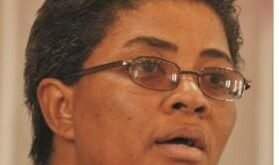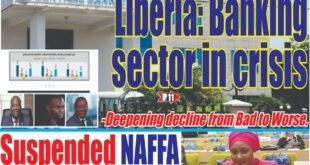At least 470 officers drawn from various security agencies have been trained to combat drug trafficking and abuse here.
By: Kruah Thompson
The Government of Liberia, through the Technical Working Group established by President Joseph Nyuma Boakai to prevent drug and substance abuse across Liberia, has provided training for 470 joint security officers.
The training covered areas such as border management, vehicle patrol searches, maritime security, incident reporting, cybercrime prevention, and financial intelligence.
Following their training, the officers were deployed at the various border points across Liberia to enhance efforts in identifying and arresting individuals involved in the trafficking and abuse of drugs.
Making the disclosure over the weekend in Monrovia Dr. Moses Ziah II a medical doctor and psychiatrist who currently heads the Mental Health Unit at the Ministry of Health and also chairs on the Technical Working Group revealed that as a result of this interventions, the Liberia Drug Enforcement Agency (LDEA) has seized several consignments of drugs with an estimated street value of USD 5.5 million in recent months.
He further disclosed to the NewDawn that due to the same intervention cannabis farms have also been destroyed in three counties- Lofa, Nimba, and Grand Gedeh. Additionally, 25 defendants have been convicted and sentenced to terms ranging from 1 to 20 years.
Dr. Ziah noted that the Technical Working Group has developed major strategic work plans that now guide the government’s drug intervention programs nationwide.
“In its effort to establish a hospital-based intervention, the Technical Working Group convened all relevant agencies to design a national action plan, which was later termed the National Drug and Substance Abuse Program,” he explained that The plan outlines specific activities for all line ministries, agencies, and key partners and stakeholders, including UN Women and the UN Peacebuilding Project.
He described the plan as a “holistic approach” to tackling substance abuse, structured around two main pillars including supply reduction and demand reduction.
Under the supply reduction pillar, he says the program targets drug dealers, traffickers, and importers by blocking the entry points of illicit substances into the country and curbing local production.
Dr. Ziah emphasized that the LDEA, as co-chair of the group, is taking the lead in enforcing this component, with support from the UN to empower officers to implement these measures effectively.
According to him, the demand reduction pillar, on the other hand, focuses on preventing substance use, especially among young people, and providing treatment for current users. “Our goal is to prevent the initiation of substance use and provide treatment and recovery services for those already affected,” he said.
Dr. Ziah also acknowledged the recent amendment to Liberia’s drug law, which seeks to increase penalties for drug-related crimes.
He stressed the importance of wide dissemination of the law to ensure its effective implementation.
To this end, he says, the Ministry of Justice has printed and distributed over 1,000 copies of the amended law to law enforcement agencies to raise awareness about its enforcement and applicability.
“The law criminalizes possession and distribution of drugs. However, many users are victims themselves,” he said. “This legal framework ensures that when individuals are arrested for drug use, they are referred for treatment rather than being sent directly to prison.”
He revealed that the Ministry of Justice is working on a legal framework known as “punitive to incarceration”, which seeks to treat rather than punish drug abusers.
“This framework will ensure that people arrested for drug use are properly channeled into treatment programs instead of being jailed,” he reiterated.
In line with this approach, Dr. Ziah said the Ministry of Health has designed a Comprehensive Prevention Intervention that includes three levels of prevention including primary, secondary, and tertiary.
He revealed that the Primary prevention targets young people who have never used drugs, educating them about the dangers to discourage usage. While the Secondary prevention focuses on those who may be experimenting or using minimally.
Meanwhile, he added that the Tertiary prevention addresses individuals already heavily involved in drug use, providing them with rehabilitation and support services.
 JamzNG Latest News, Gist, Entertainment in Nigeria
JamzNG Latest News, Gist, Entertainment in Nigeria









